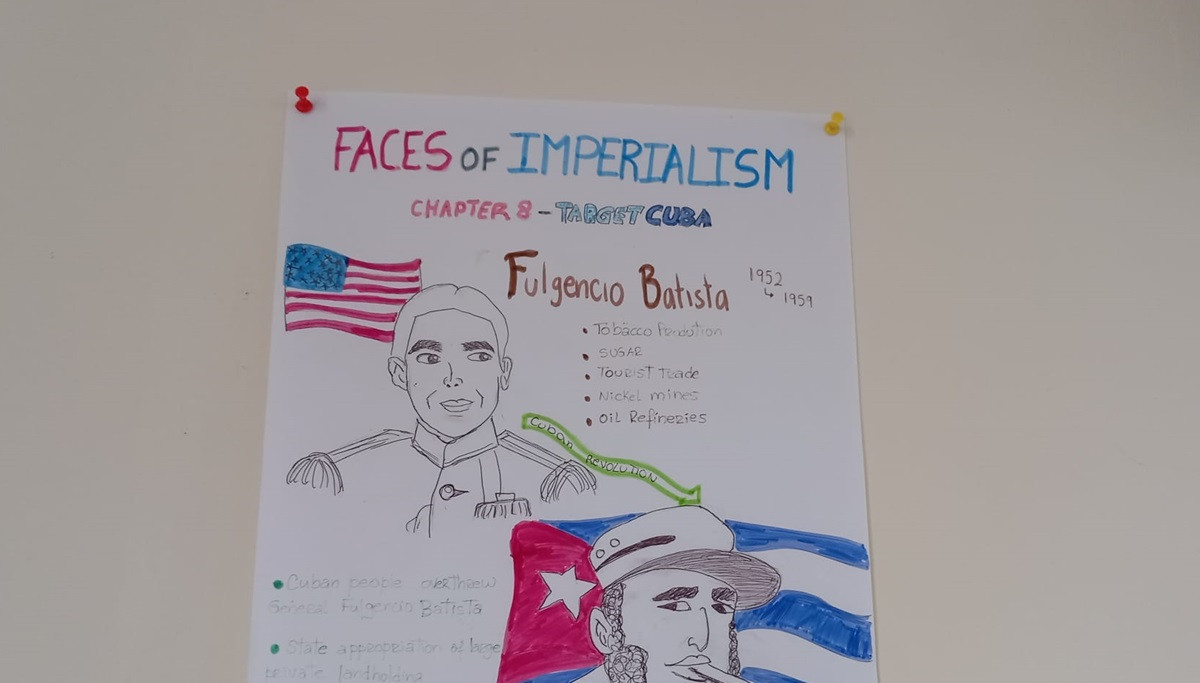What do you study as a Poverty Activist?
“Like slavery and apartheid, poverty is not natural. It is man-made and it can be overcome and eradicated by the actions of human beings.” – Nelson Mandela
By Mel Pita, Teacher in the Poverty Activist Team / End of October 2023
Hello again…
Last time I wrote to you about the second period of the programme – The forces that run the World. Today I will tell you about the current period we are in – Period 3 – The fight of the Poor and Solidarity Humanism. This period lasts for 7 weeks and it is one of the most important ones (ok, all of them are important - but we do give more time to this period and special relevance due to its content).
We have finalised the last period with a fantastic People’s Exam – read more about that here!
We have during the first 2 weeks of this period been through the section Africa – Rich Lands, Poor People, studying about the birth place of our ancestors, the scramble of Africa and discussing and deepening our understanding of colonialism and apartheid.
We have also been digging deeper into the Liberation movements of Africa and the “resource curse”… we concluded that people in an area with desired resources are likely to benefit very little while risking violent conflicts and growing inequality. During this section of the period we also started getting an overview of Africa’s climate, infrastructures, cities and the main geographical features of the African Continent.
The Federation Humana People to People
Because our Development Instructors will be doing development work with our partner, the NGO Humana People to People, we find it of upmost importance for them to get an understanding of the projects, the history, the ethics and the work of the organisation.
During the studies and courses we went through Humana People to People history, getting an understanding of when it started and what were the needs in the world that propelled Humana’s start in the end of the 70-s, going deeper into the philosophy and getting a global overview of the hundreds of projects of this NGO. We also learned about the different project types and the approach to development taken by the organisation. Then we went more specifically to study educational projects (the DNS movement, Schools for children and Youth, 400 Primary School Teachers, Farmer’s Clubs and Total Control of Epidemics).
It's time to choose the project!
We also had one of the BIG days of the preparation period – the day that we received the descriptions of the projects and the development work to be carried out during the 6 months service period. Big decisions need to be made soon, and we will write about that in a very near future.
The projects available for this team of 8 are:
- DNS Teacher Training College in Amalika (Malawi), with positions as team teachers as well as working with the rural area preschools around the College;
- DNS Teacher Training College in Dowa (Malawi) – also with positions as team teachers and in preschools in the rural areas;
- Youth in Action in Ndola (Zambia) which is a project to provide platforms for young people to meet to share experiences and ideas, as well as channel their energy and potential in a positive and productive manner.
The next steps are to get as much understanding as possible of what is required to do at the projects and make a decision of who goes together to which of the projects. This usually requires some time and quite a lot of self-evaluation as well as planning to get ready, training project skills, studying, learning a local language and get ready for the enriching and challenging period yet to come.
Preparing for the 6 months in Malawi or Zambia
For the rest of this period we will be going deeper into leadership skills, planning how to become a better leader and boost our leadership potential. We will also go through the struggle of the Poor and start to get ready for the investigation that will be at a local level regarding who are the poor in the rich country we are in and what makes them poor. This specific part of the programme is very important, to get an understanding of the reality where you are at the moment. United Kingdom has rising numbers of people living in poverty and the gap between rich and poor is growing.
This period will end with another People’s Exam where the DIs will be expressing what they have learned, highlights and challenges from this period and what is going to come next… which I am personally very much looking forward to, after the very successful People’s Exam that they presented after the previous period.
I would like to end with a quote I read today and got me thinking about Development and what it is:
“Every now and then a man's mind is stretched by a new idea or sensation, and never shrinks back to its former dimensions.”― Oliver Wendell Holmes
Once you get into development, and the wonderful circle of continuous learning, you are always moving forward.
Write to you soon,
Mel








